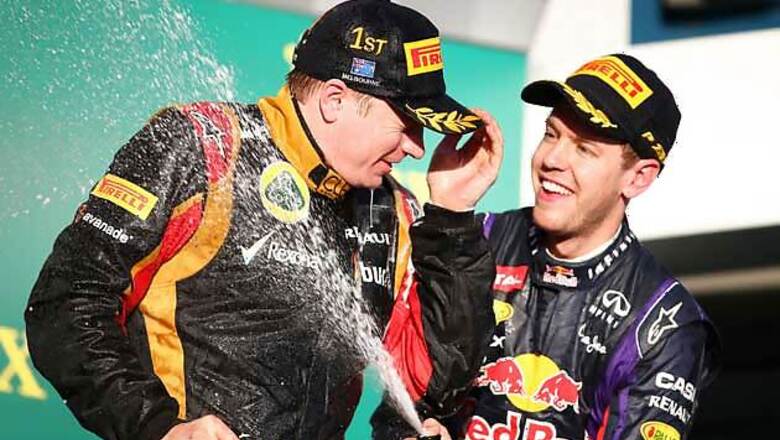
views
Melbourne: As Kimi Raikkonen and his Lotus team basked in the glory of winning the season-opening Australian Grand Prix, Formula One heavyweights Red Bull and McLaren were left to ponder how things went so wrong.
Raikkonen took out Sunday's race by a comfortable margin and, in an ominous statement for his rivals, said it was one of the easiest of his 20 career wins. Prior to the race, when Red Bull locked up the front row on the grid, many observers were worrying about the potential for a season of Red Bull domination and the seeming inevitability of Sebastian Vettel marching to a fourth straight championship.
A couple of hours later, after Vettel finished a distant third and team-mate Mark Webber scrambled to place sixth, Red Bull chiefs were searching for answers.
One thing was clear: the 2013 Red Bull car seems to be much harder than rival cars on the new rapid-degradation Pirelli tyres. While Vettel sped away from pole position in trademark style, he was drawn back to the field after just a couple of laps and was the first of the front-runners to pit.
Team principal Christian Horner put the problem down to unusually cool conditions at the Albert Park circuit, which were similar to the conditions of European winter testing when Red Bull had serious difficulties with the tyres.
"The conditions were a significant factor today and we were just out of the window," Horner said after the race. "All things considered, third place was actually a very, very good result.
"We have learned an awful lot today and hopefully it will not be quite as chilly next weekend."
Chilly is not a word readily associated with Malaysia, which will host the second round of the championship this weekend at the Sepang circuit outside Kuala Lumpur. The tropical heat may cure Red Bull's tyre ills but the conditions will do little to improve the fortunes of McLaren, which is well off the pace of its usual rivals Red Bull and Ferrari and now seemingly some way behind Lotus and Mercedes.
Jenson Button, who had won the Australian Grand Prix in three of the previous four years, performed as well as could be expected in a difficult car to take ninth position, while Mexican driver Sergio Perez could be forgiven for wondering what he had got himself into by moving to McLaren and finishing 11th.
McLaren chose to make major changes to its car design for 2013, while rival teams took a more conservative, evolutionary approach. The logic behind the decision was that, while the team would struggle to get a full understanding of the car in the early races, it would have more room to improve in the latter half of the season.
But with another radical redesign required for the 2014 cars, to accommodate the switch to V6 turbo engines, McLaren chiefs would be wondering if it is worth the effort to put significant work and funds into the 2013 car if it is too far off the championship pace by the time the car is competitive.
The 2012 McLaren, which won the last two races of last season, is sitting back in the United Kingdom at the team's Woking factory. With only minor adjustments, it would likely be much more competitive in the early races than is the current model.
Clearly there is no time to make such a switch before Malaysia, but team principal Martin Whitmarsh hinted there may be a major rethink of the approach sooner rather than later. Asked after the Australian GP whether the team may revert to an updated model of the MP4-27 used in 2012, Whitmarsh said: "Not before next weekend that is for sure."
"We are not too proud to say when we get things wrong, and we do occasionally. But for the time being we have to try and get some understanding and do the best job we can do going forward with this car as quickly as we can.
"It probably won't be as quick as I'd like, or many people would like, but we think we can work this one out. But if we can't, we will look at anything."




















Comments
0 comment